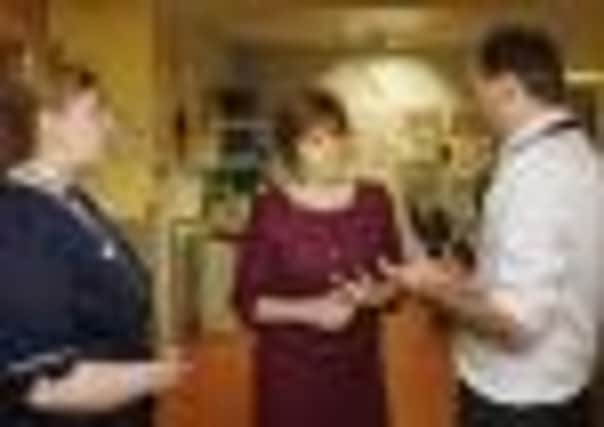Minimum alcohol pricing: Debate rages over benefit and cost of limit


Many of the country’s leading health professionals backed the Scottish Government’s plan to impose the controversial price ban limit, saying it was a “brave” step towards tackling one of Scotland’s biggest problems.
Doctors told how setting the minimum cost at 50p would reduce the health issues caused by excessive drinking and prevent about 8,600 hospital admissions every year.
Advertisement
Hide AdAdvertisement
Hide AdHealth minister Nicola Sturgeon announced the 50p plan during a visit to Glasgow Royal Infirmary on Monday and said the ban limit could be in force as soon as April 2013.


The legislation, expected to be passed by the Scottish Parliament later this month, will see the cheapest 70cl bottle of vodka or gin cost £13.13, whisky rise to £14 and a the minimum price for a bottle of wine set at £4.50. Sheffield University’s alcohol research group was commissioned by the Scottish Government to examine the impact of the policy and concluded the 50p minimum would reduce overall alcohol consumption by an average 5.5 per cent. In heavy drinkers, this figure increases to a 10 per cent drop.
It is also claimed the legislation will lead to 3,500 fewer crimes and save the NHS and criminal justice system £64 million in harm reduction in its first year of introduction.
However, critics say the policy will lead to supermarkets gaining millions of pounds in extra profits and claim that only limited research has concluded that it actually reduces drinking levels and alcohol-related health issues.
They also warn of surge in counterfeit wine and spirits, with the Local Government Association claiming the move will encourage people to turn to cheap fake brands, which often contain lethal chemicals such as anti-freeze.
Ms Sturgeon said the policy was an essential tool for Scotland to make headway in tackling the crippling cost of alcohol on society.
“Cheap alcohol comes at a price and now is the time to tackle Scotland’s unhealthy relationship with alcohol,” she said. “Too many Scots are drinking themselves to death.
“It’s no coincidence that while the price of alcohol has reduced, the number of alcohol-related hospital admissions has quadrupled. People who drink most heavily tend to drink stronger, cheaper alcohol.” She said it was unacceptable that under the current pricing method, a teenager could buy enough alcohol to kill them for less than £5.
Advertisement
Hide AdAdvertisement
Hide AdThe health minister said she hoped the move would reduce the amount of alcohol drunk and, in the longer term, reduce the strength of products on sale.
She defended the policy against a large number of critics including drinks manufacturers and Labour – the only party to oppose minimum pricing in Scotland – saying evidence from Canada, where a minimum drink price exists, shows a drop in both alcohol-related health issues and consumption.
She said the 50p rate was equivalent to the 45p per unit put forward by the SNP in the party’s 2010 proposal after taking account of inflation.
The minister said there was no evidence to suggest the pricing would lead to increase in alcohol trade on the black market or encourage people to travel south of the Border for cheaper products.
Chief Medical Officer Sir Harry Burns backed the pricing change, saying alcohol affected the health of people from all walks of life, not just those in deprived areas.
“Access to cheaper alcohol has spiralled to a ridiculous extent,” he said.
“Scotland now has the highest alcohol-related mortality rate in western Europe.
“This is a brave move by the Scottish Government and it is not without its critics, but I believe it is the best chance we have of reducing the quantity of alcohol we drink because people who buy alcohol will have to buy less.”
Advertisement
Hide AdAdvertisement
Hide AdDr Brian Keighley, chairman of the BMA in Scotland, praised politicians for “leading the world on public health policy”.
He said: “By setting the price at this level it is estimated at least 8,600 alcohol-related admissions and deaths will be prevented.”
Dr Evelyn Gillan, chief executive of the charity Alcohol Focus Scotland, said: “A 50p minimum price could save 500 lives a year and will put an end to irresponsible practices by supermarkets where a unit of alcohol can be sold for less than 15p.”
Scotland’s police chiefs also backed the policy saying it had the potential to cut crime. Latest figures show half of Scottish prisoners were drunk at the time they committed an offence.
But Scotch Whisky Association chief executive Gavin Hewitt warned minimum pricing would damage the industry and said there was no evidence that it will reduce the number of hazardous drinkers.
Scottish Labour refused to back down on its opposition to minimum pricing on Monday night, saying it would only back the policy if the Scottish Government accepted its proposal to claw back the multi-million pound windfall the policy generates.
The UK government and the UK-wide Labour Party both support minimum pricing and Westminster is currently looking at setting a 40p per unit minimum price.
Labour’s shadow public health minister at Westminster, Diane Abbott, backed the Scottish Government’s stance and tweeted that she supported the 50p policy.